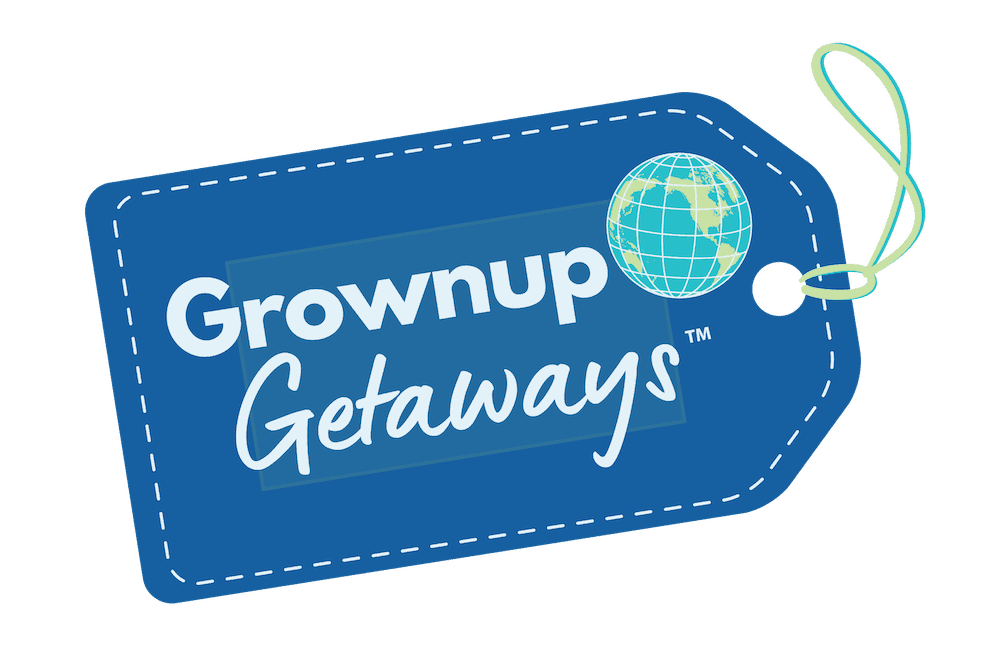Are You Ready to Turn Your Hobby into a Business?
So you want to turn your hobby into a business. Maybe you’ve lost your job, you’re seeking a side hustle to supplement your income, or you want to dump your day job in favor of something more fulfilling. You might be ready to take the leap from doing your hobby for fun, to earning some cold hard cash for your efforts. Is it time to take the plunge? Here are five crucial steps to take if you want to turn your hobby into a business.

Travel Mamas and Grownup Getaways sometimes receive compensation and/or hosted travel and sample products related to blog posts. This story may include affiliate links for which we receive a small commission at no extra cost to consumers. As an Amazon Associate, we earn money from qualifying purchases.
1. Outline exactly how you will make money.
Entrepreneur Stephanie Be built a business that allows her to pursue her hobby of traveling the world. First, Stephanie traded corporate America for a gap year of travel. Then she kept on traveling. Now an award-winning professional traveler, Stephanie shares her adventures and lifestyle via Instagram and her blog, TravelBreak. She also earns income from speaking engagements and marketing consultation.
Stephanie said, “The difference between a hobby and a business is monetization. When you understand how to monetize on your hobby, it becomes a business.” She advises asking yourself practical questions before making the leap. “How much is it going to cost to sustain your business? How many hours is it going to take to sustain your business? What are your revenue streams? How will they scale? What are you offering that is unique? What problems are you solving?”
Developing a business plan will help you think through details about your potential business. Not sure where to start? Many cities have Small Business Centers with classes and counselors to help you not only understand your business finances but also help you find grants and funding for your small business. Books like Creating a Business Plan for Dummies and The 1-Page Business Plan are great resources for budding entrepreneurs as well.
2. Understand tax benefits and liabilities.
Running your own business means you can deduct your business-related expenses and reduce your tax liability. If you’re a photographer, you can write off camera costs, gear purchases and printing expenses. If you’re an artist, you can write off all business-related art supplies. If you’re a caterer, you can write off cooking equipment and ingredients. Depending on your hobby and its business potential, that can mean big savings over the course of a year. Talk to a tax advisor to see how your expenses should be treated.
Of course, running a business does not come without liabilities. You may want to consult a lawyer about incorporating your business to protect from legal snafus. If, for example, someone becomes ill from a bad batch of your cookies, then you want to be sure it’s your business that gets sued so you don’t lose your shirt…or your house.

3. Consider how your relationship with your hobby will change.
Turning your hobby into a business is an enticing proposition. You’re turning something you already love into a money maker. Keep in mind, though, that turning a passion into a profession can suck some of the fun from it. Those things you loved to do just for fun can become annoying stressors when there are demands and deadlines to meet.
Being your own boss is empowering, but it can be stressful, too. It means kicking yourself in the rear when needed. Success or failure will fall entirely on your shoulders. You don’t have to stick to your original plan — all businesses adapt as they grow — but you should only change your business plan if you have a better path in mind.

4. Be honest with yourself.
Determine if you’re willing to make sacrifices to make your business succeed. If, for example, you will be launching a side hustle while keeping your 40-hour-per-week job, and you sleep about seven hours each night, that leaves 79 hours of free time per week. Even if you add parenting responsibilities, exercise, and housework to the mix, you are still left with hours to fill. How do you want to spend them? Giving up Candy Crush and Netflix sounds great on paper, but will you?
To transition from hobbyist to professional, you need to determine how many hours it will take to produce a salable product or service, and build an audience or client base. You may need to work long hours for a long time before you’re able to make a profit. And there’s no one else to pick up the slack when you’re feeling sick or tired. Of course, once you have the budget for employees, freelancers, or interns, you can delegate to your heart’s content.
“Working for myself, doing the things I love — I couldn’t ask for more,” said Ella Stern, a personal development counselor. “My work genuinely doesn’t feel like work because I’m incredibly passionate about what I do. Being your own boss gives you freedom, flexibility and the power to control your finances. But it’s not always an easy ride.”
If you’re serious about turning your hobby into a business, then you should map out exactly how many hours you will devote to your endeavors. For best results, block out chunks of time in your computer calendar or day planner specifically for your business and stick to it.

5. Plan for set backs.
As the Greek philosopher Heraclitis said, “The only thing that is constant is change.” No matter how hard you work and how smart you are, many things are simply beyond your control. Economic changes, natural disasters, and health crises are just a few obstacles that can throw your business offtrack.
Hedge your bets by building in some safety nets for your business. Brainstorm additional revenue streams so that if one product line is temporarily hindered, you can keep your business afloat. For example, in addition to selling your wares or services, consider teaching your skills in-person or online, speaking about your topic of expertise to businesses or at conferences, or writing a how-to book for sale online. Once you’ve turned your hobby into a business, you might also consider purchasing small business insurance to protect what you’ve built.

Are you ready to turn your hobby into a business?
Only you can decide if you’re ready to turn your hobby into a business. Extra cash, being your own boss, and following your passion are quite alluring reasons to become a business owner. Not everyone is cut out to be an entrepreneur, though, and that’s just fine. You can have a very satisfying hobby without the stress of running a business. Know yourself, and trust yourself, and take the leap. Or not. It’s all up to you!

Save these tips for turning your hobby into a business!
Whether you’re still mulling it over or you’re ready to start your business, be sure to save these tips to Pinterest via the image above for future reference. We hope you’ll follow Travel Mamas on Pinterest while you’re at it!
Want to learn more? Would-be entrepreneurs like you also enjoy my picks for the best business books for women!
Would you like to turn your hobby into a business? Let us know in the comments below!

















Can You Handle the Pressure of Turning Your Hobby Into a Business?
A hobby is supposed to be fun. A hobby is something you turn to when you are looking to relax and escape the stress of your everyday life. The second you turn this into a side gig, everything is going to change. Now, there is a lot of pressure on you to perform.
Let’s look at the example of somebody who enjoys painting. When this is a hobby, you don’t have any pressure to make the piece “marketable.” You don’t have to concern yourself with what others may think. In other words, you are painting because it is something you love.
Once you turn this into a business, however, everything changes.
Do you have a plan for selling the piece?
Can you work fast enough to make it worth your while?
What will you do if a customer is unsatisfied?
As you can see, there are many questions you need to answer. As a hobby, your only concern was the actual painting. Once it is a side gig, everything else is a concern.
That’s a really important point for people to consider, Kanchan. Sometimes it’s hard for people to “create on demand” when an order comes in. If that’s the case for you, you should think very carefully about whether turning your hobby into a business is the right thing to do.
It really takes time and energy to turn a hobby into a business. It takes hard work. And you will feel tired and exhausted many times even if you love what you’re doing. It’s all part of it. Just keep pushing.
My hobby is concert t shirts. I’m in love with them, so I want to sell em. Great comments everyone! I’m learning Ecommerce and love to see faith and encouragement here. xoxo
Best wishes for much success with your concert t-shirt biz, Rosie!
Along these. I like to add that people should also have complete dedication. There are sometimes when we don’t get what we planned, at that time, only dedication and patience will help them out.
That’s a great point, Sapana. There are always bumps along he road, and you have to be ready to face them head on and continue to move forward.
I love love love what you share here – every part of it is so true!! I’ve been my own boss since 2011, and I’ve gone through just about every emotion there is! But at the end of the day, it’s definitely worth it!
Thanks, Makeba! And congratulations on your business!
The tax part is no joke. You don’t realize how much truly goes into it!
I hear ya, sister! I’m getting mine together now and it is not my favorite thing by any means.
These are such great tips! Thanks for outlining how to get started -sometimes the Hugest hurdle to getting started is turning a dream into a reality I feel like these are great reminders of the reality of getting it done!
Thanks, Melissa! You’re right, sometimes people have a dream about something for so long, they forget that it can be a real possibility with the proper planning.
Thank you, Paige, for this Interesting post. These are very helpful and informative tips. very amazing photography . Loved it:)
I was 16 years old when I started traveling and soon it became a passion more than a hobby. I’m so glad I started a travel business. Thanks a lot for the beautiful tips.
There are so many pieces of the puzzle to making your hobby into a business. Making all those pieces fit and be successful is a huge, gigantic commitment.
It really is. I highly recommend making use of the resources available at Small Business Centers and even your local Chamber of Commerce if you need some direction or assistance.